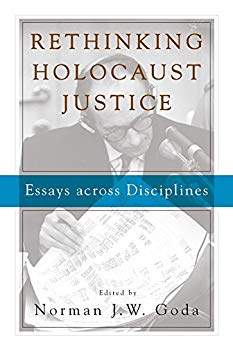Property Restitution US Courts Tool For Usually-Extralegal Pressure Goda

Rethinking Holocaust Justice, by Norman J. W. Goda (ed.) 2017
Holocaust Industry Uses the U. S. Legal System Against Its Targets, With Pressure to Settle Out of Court. Holocaust Industry’s Aggression Against Poland
This book raises diverse topics, and I focus exclusively on so-called Holocaust restitution.
Author Michael J. Bazyler is professor of law, and is involved in Holocaust litigation. The following, except for the titles in CAPS, and explanatory comments [in brackets], are direct quotes from Bazyler:
THE UNITED STATES JUDICIAL SYSTEM IS CRUCIAL FOR HOLOCAUST-INDUSTRY SUCCESS
What is exceptional is that much of the effort made for Holocaust restitution did not begin until the 1990s, more than half a century after the end of World War II. Adding to this exceptionality is that the arena where the modern campaign over restitution took place was not Europe, where the Holocaust took place, but the United States. More specifically, ground zero for Holocaust restitution was the US courthouse. (p. 235).
The US system of civil litigation, however, made the United States the world’s only forum in which Holocaust claims could be heard. The US legal culture allowed lawyers to take on high-risk cases with a low probability of success in order to test the limits of the law…US law also recognizes class action lawsuits. US lawyers and their foreign co-counsel, furthermore, could take cases on a contingency basis…The great British jurist Lord Denning recognized US courts as the most desirable forum for transnational litigation when he wryly observed in an English court opinion, “As a moth is drawn to the light, so is a litigant drawn to the United States. If he can only get his case into the courts, he stands to win a fortune.” (p. 237).
HOWEVER, THE HOLOCAUST INDUSTRY WINS NOT ON LEGAL MERITS, BUT ON EXTERNAL PRESSURES FOR THE DEFENDANT TO SETTLE
Restitution suits have had their limits. All suits have ended with out-of-court settlements, and thus the victims of the Holocaust or their heirs filing these suits never got their “day in court” in order to represent their experiences publicly, as for instance was the case with witnesses in the 1961 trial of Adolf Eichmann. (p. 247).
THE HOLOCAUST INDUSTRY AND THE POLITICS OF SHAME (PEDAGOGIKA WSTYDU) REINFORCE EACH OTHER
But the results were not only monetary…The lawsuits have also led many European states to reevaluate their wartime history by creating historical commissions to research their archives and thereafter to issue statements of contrition for their wartime behavior. The Holocaust restitution movement, therefore, yielded not only money; it also yielded new history. (p. 246).
THE HOLOCAUST INDUSTRY KEEPS TRYING TO BULLY POLAND INTO SUBMISSION TO ITS SHAKEDOWN
In 2017, ESLI [European Shoah Legacy Institute] issued The Holocaust (Shoah) Immovable Property Restitution Study, the first-ever comprehensive compilation of all significant legislation passed since 1945 the 47 states that participated in the 2009 Prague Conference. The Study found that most Western European states have complied or substantially complied with the precepts of the Terezin Declaration. The situation was bleaker for Eastern Europe. The significant outlier is Poland, the only post-communist [Communist] East European state in the European Union to have failed to enact a law covering Holocaust-era private property restitution. In April 2011, Polish President Bronislaw Komorowski called the failure the Polish parliament to pass a restitution law “a disgrace for Poland.” In 2014, fifteen members of the British Parliament sent a letter to the Polish prime minister lamenting Poland’s “failure to fulfill—or even recognize—its responsibility to victims.” In late 2015, elections in Poland brought to power the nationalist Law and Justice Party [PiS], marking the death knell, as least for the moment, of any serious efforts at restitution of real property owned Jews in prewar Poland. (p. 240).
ANY ATTEMPTED REDEFINITION OF “HEIRS” ENABLES HOLOCAUST-INDUSTRY CLAIMS TO KEEP GOING
Even the impending physical death of the last Holocaust survivor the next decade will not necessarily end efforts at Holocaust restitution. Under US law, a thief [sic!] cannot transfer good title, even to an unwary good faith purchaser. As long, therefore, as any formerly Jewish-owned land, business, art, or other personal property has not been restituted to its prewar owner or heir, a chance remains that a US-based lawsuit can succeed in returning that property to the proper owner–or compensation in lieu of actual return. (p. 252).
The impending demise of any still-living survivors means that soon only heirs will remain to continue the fight for Holocaust restitution in Poland. (p. 240).
(End of quotes).
UPDATES:
Note that the foregoing is especially relevant in light of the Letter to Mateusz Mazowiecki, on March 26, 2018, by Tammy Baldwin and Marco Rubio (involving a total of 59 United States Senators), complaining about the “unfairness”, to Jews, of Poland’s “overly restrictive” law on heirs and restitution.
It figures!
More recently, S.447 was passed, by the U. S. Congress, in a farcical rush-rush voice vote, and signed by President Trump. It attempts to force Poland to pay off the Holocaust Industry through extralegal means, based on bogus issues revolving around heirless property.
To see a series of truncated reviews in a Category click on that Category:
- All reviews
- Anti-Christian Tendencies
- Anti-Polish Trends
- Censorship on Poles and Jews
- Communization of Poland
- Cultural Marxism
- German Guilt Dilution
- Holocaust Industry
- Interwar Polish-Jewish Relations
- Jewish Collaboration
- Jewish Economic Dominance
- Jews Antagonize Poland
- Jews Not Faultless
- Jews' Holocaust Dominates
- Jews' Holocaust Non-Special
- Nazi Crimes and Communist Crimes Were Equal
- Opinion-Forming Anti-Polonism
- Pogrom Mongering
- Poland in World War II
- Polish Jew-Rescue Ingratitude
- Polish Nationalism
- Polish Non-Complicity
- Polish-Ukrainian Relations
- Polokaust
- Premodern Poland
- Recent Polish-Jewish Relations
- The Decadent West
- The Jew as Other
- Understanding Nazi Germany
- Why Jews a "Problem"
- Zydokomuna